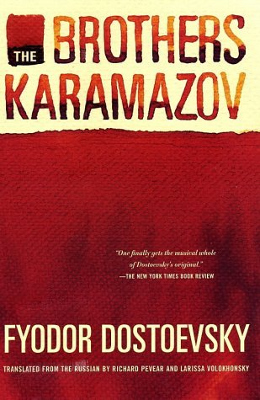“The Karamazov Brothers” Book 12: Judicial Mistake
Sunday, August 18th, 2013
Oh, did you notice the change in the wording of the title and the book cover? That’s because I was fortunate to find a used copy of the Oxford World’s Classics edition, titled (more appropriately?) The Karamazov Brothers. In Russian, the word ‘brothers’ comes first, but in English, it would not, no? Unless they were a circus show. And while it might be argued that this book is a kind of circus–A CIRCUS OF CRAZY–I still like this title better. And having read the longest segment of it from this translation, I like this far better than the Pevear/Volokhonsky which has irritated me continuously throughout this readalong. This tells me two things. One, new is not necessarily better, just a cash cow for the publisher. And c, I have liked every Oxford World’s Classics edition I’ve read it. The notes are a good balance of helpful without being information dumps while also not interrupting the text with something that can be gleaned in context.
And now, on to our longest segment.
Book 12, titled Judicial Mistake (what do you think the narrator REALLY thinks about the result? WHICH HE HIMSELF CREATED.) could also be titled Dmitri’s Trial. And my irreverent brain would often supply the “chung chung” sounds of Law & Order as this segment unfolded.
Imagine how this book could be adapted to the various L & O series, such as Original Recipe and Criminal Intent? Someone should totally do this if it hasn’t been done already. I’m checking Youtube now…nope, doesn’t exist. You are welcome to the idea, anyone.
Anyhoo, I digress; back to the book.
Ch 1: The Fateful Day. The trial begins. Lots of gawkers, especially women, who are fascinated by Dmitri. It’s Fetyukovich, the famous city lawyer hired by Katerina, on defense and Ippolit Kirillovich for the prosecution. Dmitri finds out Smerkyakov is dead and shouts. The judge tells him to zip it. This will happen a lot over the next many chapters.
Ch 2: Dangerous Witnesses. The initial testimony by the witnesses for the prosecution are pretty damning. One by one, though, Fetyukovich knocks them down. The main ingredient in Grigori’s back-pain tonic? Vodka, and lots of it. Rakitin? Took money from Grushenka. Innkeeper? Stole from a drunk Dmitri. The Poles? Cheated at cards. Dmitri shouts; judge admonishes.
Ch 3: Medical Evidence and a Pound of Nuts. Three doctors give three opinions. Herzenstube, the elderly town doctor, says D is abnormal and thus should’ve looked to the ladies when he walked in. Famous city doctor says D is manic and prone to fits of passion. (You don’t say!) Third, young doctor says D is perfectly normal. Dmitri shouts agreement; judge admonishes him to shut up. Herzenstube comes back to tell a heartwarming story about giving a pound of nuts to starving Dmitri in childhood. D came back in adulthood to thank him.
Ch 4: Fortune Smiles on Mitya: Alyosha, Katerina and Grushenka all claim Dmitri’s innocence, though with no concrete proof. Alyosha recalls an incident that would support Dmitri’s claim about having 1500 of the original 3K roubles from Katerina in a pouch about his neck. Grushenka outs Rakitin as her cousin (an interesting late stage reveal), further discrediting the little weasel.
Ch 5: Unexpected Catastrophe. Catastrophe, thy name is Ivan. When he finally takes the stand, Ivan is initially reticent, begins to leave, then pulls out the 3K roubles*, begins to rave that Smerdyakov did it and is removed into medical care. Katerina jumps into the fray, pulling out the damning letter from a drunk Dmitri, raving, and is removed into medical care. In this translation, the letter is referred to as “Proof beyond all shadow of a doubt” which makes much more sense to me than the Pevear’s “mathematical proof.” Dmitri shouts; the judge shouts back. Grushenka shouts. A very loud chapter.
*Not for the first time, I imagined Dmitri trailing FP, like the little paperboy on the bike in Better Off Dead, shouting, “Thee Thousand! Three Thousand! I want my three thousand!” Am I alone in this?
Some thoughts on Smerdyakov. Ivan’s reaction to the devil in the book 11 reminded me of his weird reactions to Smerdyakov in all their previous encounters–he is unsettled by ugly truths, has violent impulses and is talking to someone about something that no one else will believe. We were told that FP could have been the father, but not that he was.
Could Smerdyakov be….THE DEVIL?!
Ch 6: Prosecutor’s Speech. Character Sketch. Oy, this was a long one with those pages-long paragraphs. Kirillovich makes closing arguments. This is the first of four chapters he takes to do so. He introduces us to the idea that we are all Karamazovian–capable of extreme highs and dreadful degradations.
Ch 7: Background History. In a nutshell, prosecutor says Dmitri did it, and his past behavior indicates premeditation.
Ch 8: More About Smerdyakov. In a nutshell, he says Smerdyakov didn’t do it, Dmitri did, and that he doesn’t believe Dmitri checked back on Grigori.
Ch 9: Psychology Let Loose, Galloping Troika, The Prosecutor’s summing up. The end of the closing argument, which is so taxing that Kirillovich faints after, which would not have surprised me in a non-consumptive character after 4 chapters of blathering on. In a nutshell: Dmitri did it, and convicting him would stop Russia from going to hell in a handbasket, or “galloping depravity” which phrase I liked a lot. The end of the chapter has the public commenting on K’s comments, which reminded me of the chorus aspects in Dickens’ murder mystery, Bleak House.
Ch 10: Defense Counsel’s Speech: All Things to All Men. Psychology cuts both ways. Fetyukovich gets some laughs, while Kirillovich had gotten applause.
Ch 11: There Was No Money, There Was No Robbery. Yep.
Ch 12: Neither Was There a Murder. More accurately, there was not a murder by Dmitri but could’ve been by Smerdyakov.
Ch 13: Truth Perverted. Says even if Dmitri _did_ kill his father, FP was such a terrible person that it didn’t count as patricide. (Pevear uses “parricide” which can refer to the murder of either the mother/father, where Avsey uses the more specific and familiar and readable patricide for murder of one’s father.) Says Russia is a chariot, not a runaway troika.
Ch 14: Trust the Peasants! (referring to the jury) Fetyukovich is applauded. Kirillovich, again conscious, is outraged and argues back. Fetyukovich responds calmly. Dmitri again declares his innocence. Jury goes out, returns quickly (which we all know is a bad sign in a murder case, thanks to L & O) and declares him guilty on all counts. Guess what happened? “A terrible chaos ensued.” The men rub hands in glee, the women wring theirs in distress. Dmitri yells then cries. Grushenka shrieks. Dmitri is led away. Again, a very loud chapter, which closes with the chorus again.
“Twenty years down the mines.”
“At least.”
“Trust the peasants!”
“They really did for poor old Mitenka!”
Yep.
This was our penultimate section! We’re in the home stretch, with just the Epilogue and the Introduction to discuss next week.
What did everyone else think?
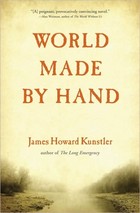
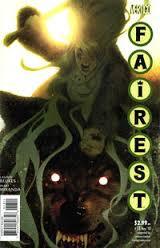
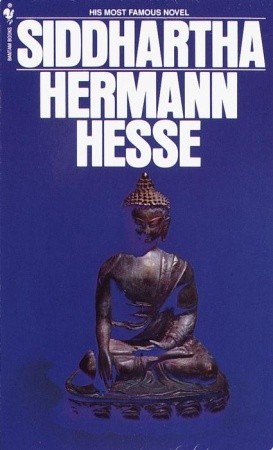

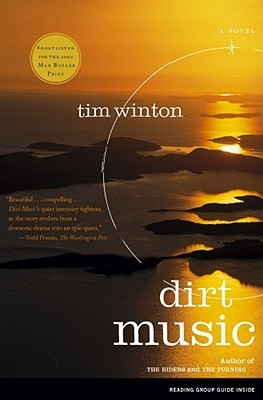
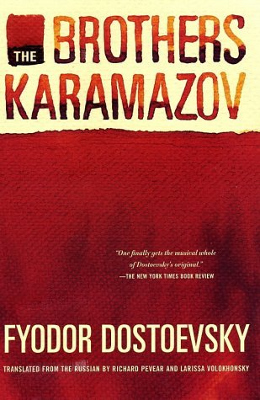
 After a less-than-stellar review in Entertainment Weekly, I was going to skip Neil Gaiman’s latest,
After a less-than-stellar review in Entertainment Weekly, I was going to skip Neil Gaiman’s latest, 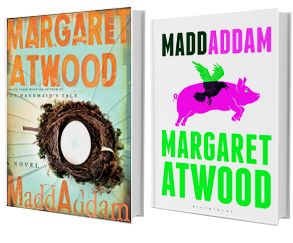
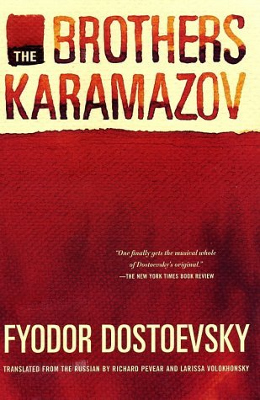

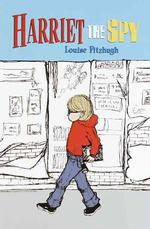
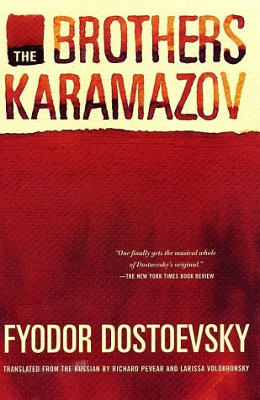 Who’s still with me? Anyone? Anyone? Bueller?
Who’s still with me? Anyone? Anyone? Bueller?
